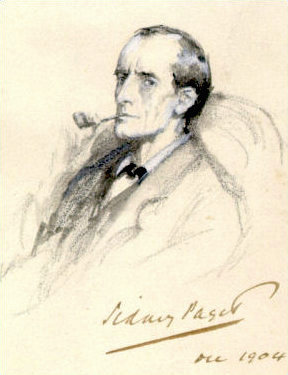Sherlock Holmes
Sherlock Holmes is a fictional detective created by British author Sir Arthur Conan Doyle. First appearing in print in 1887, Holmes is renowned for his proficiency with observation, forensic science, and logical reasoning that borders on the fantastic, which he employs when investigating cases for a wide variety of clients, including Scotland Yard.
Character[edit | edit source]
Sherlock Holmes is described as a "consulting detective", a term he coined for himself. He lives in London at 221B Baker Street, where he is often visited by clients and the Scotland Yard police force. Holmes is known for his eccentric habits and his brilliant deductions. He has an intimate knowledge of the criminal world and a vast array of arcane knowledge, which, coupled with his keen powers of observation, allows him to solve seemingly impossible cases.
Holmes's most notable characteristics include his astute logical reasoning, his ability to adopt almost any disguise, and his use of forensic science skills to solve cases. Holmes's companion and biographer, Dr. John H. Watson, shares the details of his friend's adventures with the world through a series of stories published by Doyle.
Creation and Inspiration[edit | edit source]
Sherlock Holmes was created by Sir Arthur Conan Doyle, who was inspired by Dr. Joseph Bell, a surgeon at the Royal Infirmary of Edinburgh for whom Doyle had worked as a clerk. Bell was known for his remarkable ability to draw broad conclusions from minute observations. Doyle wrote a total of four novels and 56 short stories featuring Sherlock Holmes. The first novel, A Study in Scarlet, was published in 1887, introducing Holmes and Watson to the reading public.
Cultural Impact[edit | edit source]
Sherlock Holmes has become one of the most iconic and enduring characters in English literature. The detective has been the subject of numerous adaptations, including stage plays, films, television series, and radio programs. The character has also influenced the development of real criminal investigation techniques, with many of his methods being adopted by early forensic scientists.
Holmes's influence extends beyond literature and entertainment; he has also made a significant impact on the field of criminal investigation. His emphasis on careful observation and deductive reasoning has inspired generations of detectives and forensic scientists to adopt similar methodologies.
Legacy[edit | edit source]
The legacy of Sherlock Holmes is vast, with the character being featured in countless adaptations across various media. Holmes's methods and character have set a standard for fictional detectives and have had a profound influence on the mystery and detective genre. The Sherlock Holmes Museum, located at 221B Baker Street in London, and the Arthur Conan Doyle Society, which celebrates the life and work of the author, are testaments to the enduring popularity and impact of Sherlock Holmes.
See Also[edit | edit source]
- A Study in Scarlet
- The Adventures of Sherlock Holmes
- Dr. John H. Watson
- Mycroft Holmes
- Professor Moriarty
This article is a literature-related stub. You can help WikiMD by expanding it!
Search WikiMD
Ad.Tired of being Overweight? Try W8MD's physician weight loss program.
Semaglutide (Ozempic / Wegovy and Tirzepatide (Mounjaro / Zepbound) available.
Advertise on WikiMD
|
WikiMD's Wellness Encyclopedia |
| Let Food Be Thy Medicine Medicine Thy Food - Hippocrates |
Translate this page: - East Asian
中文,
日本,
한국어,
South Asian
हिन्दी,
தமிழ்,
తెలుగు,
Urdu,
ಕನ್ನಡ,
Southeast Asian
Indonesian,
Vietnamese,
Thai,
မြန်မာဘာသာ,
বাংলা
European
español,
Deutsch,
français,
Greek,
português do Brasil,
polski,
română,
русский,
Nederlands,
norsk,
svenska,
suomi,
Italian
Middle Eastern & African
عربى,
Turkish,
Persian,
Hebrew,
Afrikaans,
isiZulu,
Kiswahili,
Other
Bulgarian,
Hungarian,
Czech,
Swedish,
മലയാളം,
मराठी,
ਪੰਜਾਬੀ,
ગુજરાતી,
Portuguese,
Ukrainian
Medical Disclaimer: WikiMD is not a substitute for professional medical advice. The information on WikiMD is provided as an information resource only, may be incorrect, outdated or misleading, and is not to be used or relied on for any diagnostic or treatment purposes. Please consult your health care provider before making any healthcare decisions or for guidance about a specific medical condition. WikiMD expressly disclaims responsibility, and shall have no liability, for any damages, loss, injury, or liability whatsoever suffered as a result of your reliance on the information contained in this site. By visiting this site you agree to the foregoing terms and conditions, which may from time to time be changed or supplemented by WikiMD. If you do not agree to the foregoing terms and conditions, you should not enter or use this site. See full disclaimer.
Credits:Most images are courtesy of Wikimedia commons, and templates, categories Wikipedia, licensed under CC BY SA or similar.
Contributors: Prab R. Tumpati, MD






